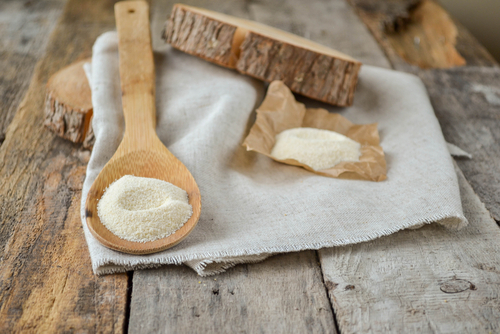Short answer
Semolina is not bad for you, and unless you have a gluten intolerance or sensitivity, can be consumed in moderation without worry.
Recommended Alternative
Overall beneficial to your health. Things rated a 'B' may have some harmful qualities to pay attention to.
View Full Grading System
Category 'A'
Very healthy and numerous health benefits. Side effects are rare. Things rated an 'A+' are typically necessary for survival (for example, water).
Very healthy and numerous health benefits. A few harmful qualities may be associated, but only under certain circumstances such as an allergic reaction.
Very healthy and numerous health benefits. Harmful qualities may be associated, but aren't usually serious.
It is important to note that even the best things in life can become bad in immoderate amounts. So, although something may be rated an 'A+', overconsumption/overdoing can bring unwanted effects.
Category 'B'
Very beneficial to your health. Things rated a 'B+' may have a few harmful qualities to pay attention to.
Overall beneficial to your health. Things rated a 'B' may have some harmful qualities to pay attention to.
More beneficial to your health than not. However, harmful qualities are most likely associated and shouldn't be overlooked.
The main difference between category 'A' and category 'B' is the harmful qualities typically present in 'B' items. Serious side effects are usually uncommon, but are still possible and should be taken note of.
Category 'C'
Both beneficial and harmful qualities associated. Things rated a 'C+' are typically a bit more on the beneficial side. Still, moderation is important.
A fairly even ratio of beneficial and harmful qualities. Moderation is important. Very general topics that can lean towards both sides of the spectrum will be placed here as well. Rice, for example, can be good or bad depending on the type.
More harmful than beneficial. Side effects are common, especially when consumed/done excessively. Moderation is very important.
Category 'C' usually denotes to both good and bad qualities. When it comes to this category, it is important to keep this word in mind: moderation.
Category 'D'
Harmful to your health. Although benefits may be associated, the bad most likely outweighs the good. Moderation is very important.
Harmful to your health. A few benefits may be associated, but the bad outweighs the good. Moderation is extremely important.
Harmful to your health. Very few, if any, benefits are present. Things in this category should be avoided as much as possible.
Category 'D' is typically for things that are more harmful than beneficial. While consuming/doing something unhealthy once in a blue moon shouldn't hurt, we definitely recommend eliminating 'D' items as a regular part of your routine/diet.
Category 'F'
Category 'F' is for things that fail to bring anything beneficial to the table, and are very harmful to your health. We recommend completely avoiding anything in this category. Long-term side effects of 'F' items are usually very serious.
Category 'N'
'N' stands for neutral. Things placed into this category are generally (a) neither good nor bad for you, or (b) lack the necessary evidence to reach any conclusions.
Long answer
Semolina is made of ground wheat and commonly found in foods such as pasta, couscous, bread, and cereal. A healthy serving is about a quarter cup containing just 150 calories made up of mostly carbohydrates. This same serving size of semolina contains 5.3 grams of protein as well.
This grain is also rich in B vitamins, with roughly 109 micrograms of folate (25% of the daily value) and about 30% of the daily value of thiamine. B vitamins are used in almost all metabolic processes in the body including creating energy, supporting brain and nervous system function and red blood cell production.
Semolina is also a good source of the mineral selenium, which works on the body as an antioxidant. Antioxidants eliminate free radicals that cause stress within the body and can result in chronic disease. Selenium can also strengthen the immune system. One serving of semolina provides roughly two-thirds of the recommended daily value. Deficiency in selenium can cause recurrent miscarriages, goiter, fatigue and mental slowing.
The last major health benefits of semolina come in the form of iron. One serving contains about 1.8 milligrams of iron. Iron helps to circulate oxygen in the bloodstream and builds up the immune system to fight infection. If you do not get enough iron in your diet, it can result in anemia, fatigue, changes in heart rate, pica, and tingling in the legs.
The possible undesirable effect of semolina comes into play when consumed by someone with a gluten intolerance or gluten sensitivity. Gluten is a protein found in wheat and some other grains that can cause a type of allergic or immune system reaction. In those with celiac disease or gluten intolerance, any foods containing gluten causes intestinal inflammation and ultimately damage that can prevent nutrients from being absorbed. Sensitivity also results in some intestinal inflammation, along with fatigue and headaches.
Possible short-term side effects
- allergic reaction
-
gastrointestinal problems
-
inflammation
-
bloating
-
diarrhea
Ingredients to be aware of
Benefits
- good source of:
-
folate
-
thiamine
-
iron
-
selenium
Our Wellness Pick
(what is this?)
Bob's Red Mill Teff
- Whole grain goodness
- Rich in fiber
- High in protein
- Gluten-free
- Versatile use
Learn More!
Please turn your Ad Blocker off to see this content. Thank you!
Thank you for your feedback!
Written by Kristin Brown, DC, MS
Published on: 07-03-2016
Last updated: 12-15-2023
Thank you for your feedback!
Written by Kristin Brown, DC, MS
Published on: 07-03-2016
Last updated: 12-15-2023

 Approved by
Approved by 















